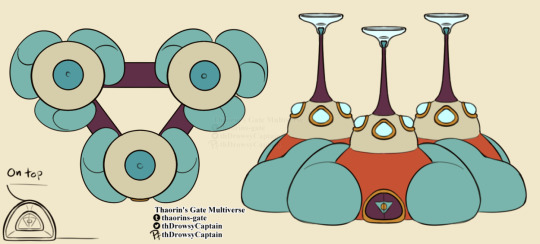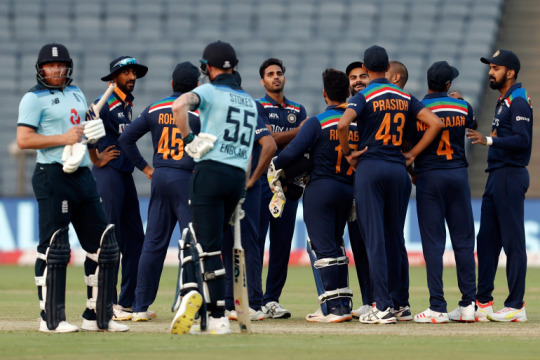#biosecurity bubbles
Text
CCSDIV - Central Control for the Spread of Disease, Infection and Virus
PPE - Personal Protective Equipment
Neterar'iris have three levels of biosecurity. Home safety, which is the lowest. Sterile Communities, which is the middle range. External communities, the highest. It should be noted that immunity has built up over time and with each generation born inside the Prime Nexus they are gradually becoming more immune to the local environment.
All biosecurity measures are recommended and enforced by the CCSDIV which is a world-wide organization that works to ensure the wellbeing and health of all Neterar'irians.
Home Safety
These have the lowest amount of safety measures. Neterar'iris who live in the same dwelling are considered safe, so PPE is not required. Quarantine measures are taken if someone is sick. Usually they are sealed in the Quarantine Suite (complete with a bed, bath and kitchenette) until they are no longer ill or contagious. Sometimes whole households quarantine just in case anyone is a carrier.
When having guests over, it is advised that everyone wears PPE. Dwellings have special rooms called Mohi (Moe-high) that they receive guests in. These rooms are sterilized after each visit and have special sealing doors which prevent any foreign bacteria from entering the rest of the house. Neterar'iris going in and out of the Mohi shower off any potential bacteria before entering the rest of the house. It is unheard of to receive guests in the living space of one's home.
Sterile Communities
Sterile communities are Neterar'iris neighbourhoods. They are made up of several dwellings in the same building. Neterar'iris need to sterilize before entering or exiting sterile communities, and this is done so through a disinfectant chamber (which sprays a light mist of sanitizer on the Neterar'iris inside). If someone wants to open a window in a sterile community, the room they are in seals to prevent the spread of bacteria. The air is cycled outside and cleaned after they close the window, before they can leave the room.
Sterile communities legally have to have grocery stores so that their residents can have access to safe food. They can have other stores, such as clothing or hardware stores, but they're not legally required. Any store in a sterile community is required to quarantine their products for at least a week before selling them. Perishables are stored in an enchanted quarantine unit to prevent them from going bad.
Sterile Communities are shaped similar to Rem'j. They utilize smooth shapes instead of angles, having a drop-like body and ovular housing units. Each housing unit is attached around a main body, and can curve over the top of pathways connecting the bodies. There are typically 3-9 bodies in a cluster, with an average of 2-3 housing units per body. Housing units can also have windows, which either are one-way and cannot be seen from the outside, or bubble-like for Neterar'iris to sit inside. At the top of every main body is a funnel which collects rain water, that is stored in tanks. This water can be recycled for the filtration system, as well as the watering system for the garden in the center of housing units. This garden is open to all residents.

External Communities
External communities have the least amount of biosecurity measures. It is harder to ensure everything is sterile in a larger community, as external communities are Neterar'iris cities. While they have biosecurity measures such as wearing PPE, washing your hands regularly, using hand sanitizer, and encouraging people sick to stay home, they don't have mandatory cleansing spaces.
External communities can have many stores, including grocery stores. They are not required to sterilize their products for a week, and some people consider external grocery stores "better quality" because they are preservative-enchantment-free. Retail stores are primarily found in External Communities, as they can get business from many sterile communities.
Spaces such as hospitals, clinics, schools and government buildings have biosecurity measures. You need to use a disinfectant chamber when entering and exiting.
2 notes
·
View notes
Text
Touching try celebration melts hearts
Touching try celebration melts hearts
New Zealand Warriors winger Dallin Watene-Zelezniak melted the hearts of NRL fans with a moving try celebration against the Rabbitohs.
The New Zealand Warriors went down to South Sydney in a heavy loss on Saturday afternoon but a heartwarming moment meant their fans had something to smile about.
Early in the first half, Warriors winger Dallin Watene-Zelezniak scored the first try of the game…
View On WordPress
#australia#Australia and New Zealand#biosecure bubble#Cameron Murray#Cody Walker#cooper cronk#cronulla sharks#Fox League#Gold Coast#heartwarming try celebration#Latrell Mitchell#linebreak assist#Matt Russell#Matthew Sullivan#Nathan Brown#New Zealand Warriors#newborn baby#Oceania#Premiership Season#Purdy#queensland#Shane Flanagan#south sydney rabbitohs#tackle busts#touching try celebration#try assist#try celebration#young baby#Zealand Warriors
0 notes
Photo

‘Cooked’: Cricketers suffering in bio-secure bubbles, says Kohli

Cricketers are suffering after months of bio-secure “bubble” life during the coronavirus pandemic, said Indian captain Virat Kohli ahead of next month’s Indian Premier League (IPL) Twenty20 tournament.
Kohli raised his concerns after India beat England by seven runs in a thrilling decider to clinch the One-Day International series 2-1 in Pune on Sunday.
Players from both sides moved on immediately to join their squads for the world’s richest franchise Twenty20 tournament, which starts on April 9, and all will have to go through restrictions again in the IPL “bubble”.
“Scheduling needs to be looked at in future, because playing in bubbles for so long, two to three months, is going to be very, very difficult going forward,” Kohli said.
“You can’t expect everyone to be at the same level of mental strength. Sometimes you do get cooked and you do feel like a bit of a change.
“I am sure things will be discussed and things will change in the future as well. But a different tournament, it brings fresh challenges heading into the IPL.” Kohli added.
Since August last year, most international players have been restricted to staying inside bio-secure “bubbles” with only small breaks.
From September to January, India’s players went through similar quarantine and isolation regimes in the delayed 2020 IPL in the UAE and their tour of Australia before having a short break ahead of the home England series which comprised four Tests, five Twenty20 matches and three ODIs.
Rotation policy
England’s rest-and-rotate policy ensured players had breaks during their three months touring Sri Lanka – where they played two Tests – and India.
England player Jos Buttler, meanwhile, said he was “excited” to take part in the tournament which lasts until May 30. He said England management had kept players in top mental and physical shape.
“It’s been great that everyone’s health has been really looked after and whenever it’s possible to get out of the bubble and back in,” said Buttler, who stood in as captain for injured Eoin Morgan in the last two ODIs.
“So we are all very thankful of that to help with those situations and also it’s about how we plan moving forward. That’s going to be part of player welfare.”
England, who have already played six Tests in 2021, have an intensive calendar ahead and are scheduled to play another 12 Tests by January 2022: five at home against India, two against New Zealand and five away Ashes Tests in Australia.
They will also have limited-overs series at home against Sri Lanka and Pakistan before they return to India for the Twenty20 World Cup in October.
Read full article: https://expatimes.com/?p=19575&feed_id=39841
0 notes
Link
Psychologists have called for better support for cricketers' mental wellbeing as they head into a second year confined to biosecure "bubbles" around the world.
0 notes
Text
Social media post raises fears of biosecurity breach by Indian players
Social media post raises fears of biosecurity breach by Indian players
A social media post by a fan sparked concern on Saturday, with Cricket Australia hinting at a possible breach of bio-security protocols by five Indian cricketers.
The incident in question took place on New Year’s Day in Melbourne, when Rohit Sharma, Rishabh Pant, Prithvi Shaw, Shubman Gill and Navdeep Saini were shown in a Twitter post by one Navaldeep Singh eating out at a restaurant.
Navaldeep…

View On WordPress
#aus vs ind#australia vs india#bio bubble breach#biosecurity#breach#fears#india vs australia#Indian#media#navdeep saini#Players#post#prithvi shaw#raises#rishabh pant#rohit sharma#shubman gill#social
0 notes
Text
Shan Masood glad Pakistan not in a bio-secure bubble in New Zealand
Shan Masood glad Pakistan not in a bio-secure bubble in New Zealand
Image Source : AP
Masood said it was tough for the players to isolate in their hotel rooms, but the players knew once the isolation ended they could “live like normal people.”
Pakistan batsman Shan Masood says knowing they had to isolate for only two weeks in New Zealand makes their ongoing cricket tour arrangements far more bearable than when they toured England. All but one of Pakistan’s…

View On WordPress
#BioSecure#bubble#cricket news#Glad#Masood#Pakistan#Pakistan in New Zealand#Pakistan vs New Zealand series#Shan#shan masood#Shan Masood news#Shan Masood Pakistan#Zealand
0 notes
Text
Early Era CCSDIV Measures
CCSDIV - Central Control for the Spread of Disease, Infection and Virus
PPE - Personal Protective Equipment
Since the Neterar'iris of this era are predominantly nomadic, and when sedentary live in small towns, they take extra precautions with PPE to protect themselves. When the Neterar'iris came to the Prime Nexus, they had little time to bring supplies with them. Thankfully, public health was a huge consideration during the move. While they did not have the resources to sustain their advanced levels of biosecurity they were able to keep their PPE and some of the more basic practices.
While these are labelled as CCSDIV measures, the CCSDIV was not formed until much later. The CCSDIV put into place heavier regulations on pre-existing social practices.
Home Safety
Sedentary
These have the lowest amount of safety measures. Neterar'iris who live in the same dwelling are considered safe, so PPE is not required. Quarantine measures are taken if someone is sick. A section of the house will be "sealed" off by closing all the doors and windows and restricting those who can go inside. They cannot seal doorways, however, they still have small suites in their homes called Quarantine Suites (complete with a bed, bath and kitchenette) which restrict Neterar'iris needing to enter or exit the infected area.
When having guests over, it is advised that everyone wears PPE. Dwellings have special rooms called Mohi (Moe-high) that they receive guests in. These rooms are sterilized after each visit and are only used to receive guests so any potential infection is not passed to other members of the house. It is unheard of to receive guests in the living space of one's home.
Nomadic
Nomadic Neterar'iris have very few options in regard to home safety. They live in communal tents with their close family. When someone is sick, they are isolated in a Ti'Mohi (Tea Moe-high), which is a smaller tent set up a safe distance from the rest of the tents. The group will stay there until the Neterar'iris gets better or passes on. The Ti'Mohi is then burned - regardless of the outcome - and anything inside it is cleaned.
PPE is heavily encouraged amongst Nomadic groups, due to their exposure of many unknown diseases and bacteria.
Sterile Communities
Sedentary
Sterile communities are Neterar'iris neighbourhoods. They are made up of several dwellings in the same building. Sterile communities do not allow visitors who do not live in the community or are not seeking to move to the community.
Sterile communities legally have to have grocery stores so that their residents can have access to safe food. They can have other stores, such as clothing or hardware stores, but they're not legally required. Any store in a sterile community is required to quarantine their products for at least a week before selling them. Perishables are stored in an enchanted quarantine unit to prevent them from going bad.
Sterile communities are also legally required to have schools for their residents to attend.
Sterile Communities are shaped similar to Rem'j. They utilize smooth shapes instead of angles, having a drop-like body and ovular housing units. The main body is made up of several tear-drop-shaped bodies stuck together like bubbles, with housing units on each of them. Housing units often overlap each other. There are typically 3-9 bodies in a cluster, with an average of 2-3 housing units per body. Housing units can also have windows, which are bubble-like for Neterar'iris to sit inside. At the top of every main body is a funnel which collects rain water, that is stored in tanks. This water can be recycled for the filtration system, as well as the watering system for the garden in the center of housing units. This garden is open to all residents.
Nomadic
Nomadic Binsorro live in groups as it is safer to travel with a wider arrange of skill sets. Each group has at least one Neterar'iris who knows first aid (or has a background in medicine), a chef, a ranger and a leader with organizational skills. These smaller communities help expose other Neterar'iris to bacteria so that they don't become at risk amongst other people. They live in tents separated by families to reduce the risk of infection if someone did get sick, but still treat their campsite as a communal area in a sedentary sterile community.
External Communities
External communities have the least amount of biosecurity measures. It is harder to ensure everything is sterile in a larger community, as external communities are Neterar'iris cities. While they have biosecurity measures such as wearing PPE, washing your hands regularly, using hand sanitizer, and encouraging people sick to stay home, they don't have mandatory cleansing spaces.
External communities can have many stores, including grocery stores. They are not required to sterilize their products for a week, and some people consider external grocery stores "better quality" because they are preservative-enchantment-free. Retail stores are primarily found in External Communities, as they can get business from many sterile communities.
Babies and Children
Sedentary
Children start wearing PPE at the age of 5. Prior to the age of 5 they are kept exclusively in the home as they have too weak immune systems. Neterar'iris with young children heavily restrict their travel to external communities to ensure the safety of their children.
However, when pups are still in the pouch they are considered "safe" from the rest of the world. While there are social and cultural taboos surrounding leaving one's home with pouch pups, it is considered safe by the CCSDIV to visit external communities.
Nomadic
Nomadic Binsorro take a different approach to child-rearing than their sedentary counterparts. They still believe pups in the pouch are safe, however, they believe that children need strong immune systems and the only way to build that immunity up over time (over generations) is exposure. Since they do not have houses to tuck their children away, they wrap them up in PPE and monitor their health. Even the most minor cold can be fatal in the wilds, so they make sure they have a constant watch on their children. But they take a more hands-on approach to immune boosting by letting them roam free (within the eye-line of an adult).
Common PPE
Long before the Neterar'iris came to the Prime Nexus, sealing face masks were being created using a spell, rather than raw materials. This allowed free public access to proper protection. Tubing for immuno-boosting was also a perfected spell, allowing them to manifest the tubing in the exact position it needed to be without the hassle of having to tube a young child or a particularly sensitive adult.
Common PPE is a plastic face mask. This mask is often multi-coloured with seals that run around the edges, and translucent. The bands go between the antenna and rest against them, and behind the ears. Face masks are magically enchanted to seal around tubing so that buttons and zippers won't break.
Some Neterar'iris put stickers on their face masks to personalize them. Some wear their face masks underneath cloth masks. Some wear only cloth masks. It is a matter of personal preference. However, in more recent years, sealing face masks have started being worn by the majority of Neterar'irians.
#thaorin’s gate#thaorin's gate#the prime nexus#alien race#speculative biology#lore dump#world building
0 notes
Photo

Jos Buttler Urges England Teammates To Speak Up On Potential Bubble Burnout Living in claustrophobic bio-secure bubbles can take its toll on mental health and players should not feel under any pressure to speak up if they cannot cope during England’s tour of South Africa, vice-captain Jos Buttler has said.
#biosecure bubble#cricket#cricket news#England cricket team#Jos Buttler#South Africa vs England#South African Cricket Team
0 notes
Text
'It's too risky': Queensland puts NRL on notice over biosecurity breaches
‘It’s too risky’: Queensland puts NRL on notice over biosecurity breaches
The NRL’s latest alleged biosecurity breach has placed the competition in immediate danger, with Queensland’s Chief Medical Officer Jeannette Young warning she is getting close to revoking exemptions.
Key points:
Jeannette Young says she is getting “very close” to revoking the NRL’s COVID rule exemptions
Api Koroisau is alleged to have breached biosecurity rules when with the New South Wales…

View On WordPress
0 notes
Photo

IPL 2020 | CSK CEO rubbishes reports of KM Asif breaching bio-secure bubble Image Source : IPL KM Asif Chennai Super Kings CEO Kasi Viswanathan on Thursday rubbished the reports that claimed that bowler KM Asif had breached the bio-secure bubble in the UAE.
0 notes